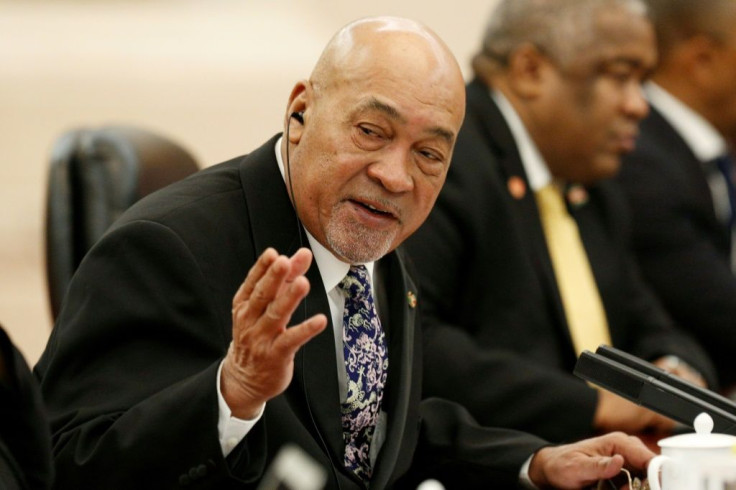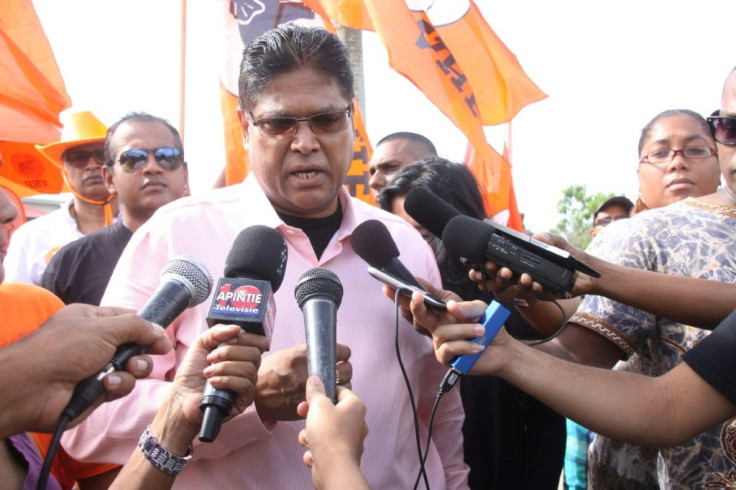Suriname Votes In Poll Crucial For Convicted President

Suriname went to the polls on Monday with strongman President Desi Bouterse seeking a third term, battling to hold onto power to avoid spending his twilight years in prison after being convicted of murder.
The former military dictator turned politician has dominated his tiny South American country for four decades but polls suggested his National Democratic Party (NDP) was likely to lose its majority in the 51-member parliament which elects the president.
The 74-year-old and his wife Ingrid Waaldring were among the first people to vote at a school in the capital Paramaribo, surrounded by supporters and media.
Authorities lifted a partial coronavirus lockdown for the day and voters lined up at 1.5-meter (five-foot) intervals before the polls opened at 7:00 am (1000 GMT).
"Just a few more hours then we have liberated Suriname," said Bouterse's main rival Chandrikapersad Santokhi as he walked from his house to vote.
An IDOS survey predicted the NDP's overall share will fall from 26 seats to between 14 and 17, with opposition parties claiming 12 of the 17 seats in the capital.
Bouterse is a controversial figure who last year was sentenced to 20 years in prison by a military court for ordering executions during a previous military dictatorship.
He first took power in a 1980 coup and in 1982 allegedly rounded up and executed 15 political opponents, including lawyers, journalists and businessmen. The incident, known as the "December killings," was investigated by Santokhi, who now leads the main opposition Progressive Reform Party (VHP).
Bouterse appealed his conviction and the case was postponed until June due to the coronavirus pandemic.
In a separate case in 1999, a court in the Netherlands -- Suriname's former ruler -- sentenced Bouterse to 11 years in prison in absentia for cocaine smuggling, a charge he denies.
Just over 380,000 people were eligible to vote in this Dutch-speaking and ethnically-diverse South American nation of 600,000 people.
Many voters turned out in their party's colors or wearing T-shirts emblazoned with the faces of candidates.
Rudy Cederburg, a senior citizen, wore purple and white, with purple sport shoes.

"I'm a true NDP in heart and soul," he told AFP. "I want this party to continue the development path it has taken, continue their development plans for this country."
The NDP campaigned on its strong track record of substantially increasing social welfare, introducing mandatory health and pension insurances, carrying out major infrastructure projects and granting property to the landless.
Opposition parties, though, accuse the Bouterse administration of numerous corruption scandals and have warned that the country cannot afford the NDP's spending.
"The current government, NDP, has made a big mess of it in the past 10 years. Things are not going well in the country," said Consuela Prade, 34, who said she was still undecided as to which opposition party to vote for.
Special coronavirus measures meant officials dabbed blue ink on the voters' fingers with an ear swab rather than letting them dip their fingers in an ink pot.
A special mobile polling station was set up at the Zorghotel in Paramaribo for 187 people in coronavirus quarantine.
The Organization of American States and the Caribbean Community are monitoring voting in the country, where ballots are often cast along ethnic lines.
The General Liberation and Development Party (ABOP) -- which largely represents descendants of African slaves -- has made its leader Ronnie Brunswijk a significant force. Brunswijk is a former jungle rebel who fought a civil war against Bouterse in the 1980s.
Many parties have publicly ruled out a coalition with the NDP as they blame the Bouterse administration for a financial crisis in the gold-and-oil-exporting nation.
While a party or coalition needs only a simple majority to take control of the National Assembly, a president requires two-thirds of the votes to be elected.
Surinamese are also electing 118 district and 772 local representatives, with 17 parties and more than 5,700 candidates on ballot papers.
Polls are due to close at 7:00 pm with partial results expected around 10:00 pm and a projection of full preliminary results early Tuesday.
© Copyright AFP {{Year}}. All rights reserved.





















